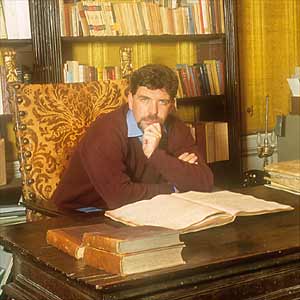|
 ver
the centuries, the historic Capponi family has contributed a great
many palaces to the architectural heritage of Florence, and it so
happened that when we put Palazzo Capponi (Hannibal's Florentine
home) onto the web site, we used the wrong one. ver
the centuries, the historic Capponi family has contributed a great
many palaces to the architectural heritage of Florence, and it so
happened that when we put Palazzo Capponi (Hannibal's Florentine
home) onto the web site, we used the wrong one.
A few weeks ago, we received a very polite e-mail informing us of
our error. The message was from one of the descendants of this noble
Florentine family, the respected historian Count Niccolò
Capponi, whose book I legionari rossi. Le brigate internazionali
nella guerra civile spagnola 1936-1939 was published this year by
Città Nuova.
We immediately grasped this unexpected opportunity and via e-mail
arranged the interview printed below, which took place in the library
of the 15th century Palazzo Capponi (in the precise spot where Hannibal
Lecter wrote his famous letter to Clarice). The appointment was
set for 10 o'clock, and after we'd been announced, Count Niccolò
Capponi came to meet us in the courtyard where we were waiting.
After we'd introduced ourselves he invited us see the rooms where
the filming had taken place. First of all he took us into the old
library, the historical archives of the family.
The Count is very lively and animated, and he told us about how
nice but also how professional Hopkins is: one day, at the end of
filming, he found himself together with Hopkins surrounded by a
crowd of fans (as the Count said, "It's like being a gladiator
at the Colosseum, all that's missing is the lions!"). But Hopkins
wasn't at all put off and very pleasantly managed to satisfy everyone
with a handshake or an autograph. He also told us about Ridley Scott's
passion for busts. He asked for all the busts of the Capponi ancestors,
which were stored in the cantina, to be brought into the room where
they were filming.
His meeting with Thomas Harris was almost casual. The Count, who
had no idea who Harris was, was asked whether he would mind showing
this distinguished American around Florence. And after lunch in
a city-centre restaurant, he also showed Harris round his palace.
Unexpectedly, in February 1999 he received a phone call from America.
It was Thomas Harris who, bowled over by the beauty of Palazzo Capponi,
wanted permission to use it in his book as the house where Hannibal
lived. After a brief family consultation, the Count sent back the
following answer: "Yes, so long as the Capponi are not the
special dish of the day!"
"Don't worry", answered Harris, "we won't mention
you at all".
"I get it", replied the Count, "we've already been
nicely digested!"
Q
Thomas Harris spent some time
in Florence while writing the book. Do you think he really understood
us Tuscans?
A
Who understands the Tuscans? That's the million-dollar question!
I admire the Sienese but I don't understand them, and the same goes
for the Pistoiese. Dante is the only one who understood the Florentines…!
Q
Why do you think Harris chose Florence?
Was it because he loved the city or did he just want to use it for
promotional purposes?
A
When I showed Harris round Florence - in any case he'd been here
before - he asked me some very specific questions, and there's no
doubt they were to satisfy his own curiosity and were not necessarily
for his book. He was very interested in the processional routes
of the Medici and other aspects of the city, and his interest certainly
extended beyond purely economic concerns. It's true that Florence
is good for sales, but I'm sure Harris chose Florence because he
loved the city.
Q
What effect does it have on you to
know that a character like Doctor Lecter lived in your house?
A: If you're referring to Anthony Hopkins, it's a very positive
impression because he's a very pleasant person and a real professional,
and being a star hasn't gone to his head at all. Apart from anything
else he's a virtuoso piano player and can do some great imitations.
As for Dr Hannibal Lecter, I refuse to believe he's a multiple homicide.
A person with so much culture, whom I had long discussions with
about the archives and about historical matters can't be a killer.
Q
What do you think about the end of
the book?
A: I think it's a logical conclusion. It couldn't have finished
in any other way. There had to be an end for the character, otherwise
the series would have become too long.
We finished the interview at 12 o'clock, the
moment in the day when the Count treats himself to the first of
his two pipes of the day. By the way, he also told us that Ridley
Scott, who's very short, smokes very long cigars… will we have
to trouble Freud on that one?
|
|



